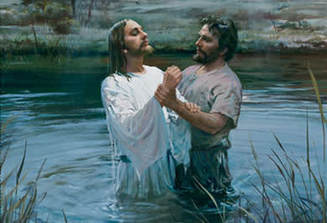 by friend and guest-writer, Frank Ouimette (This article was inspired by a talk given by Apostle Boyd K. Packer at General Conference of the Church of Jesus Christ of Latter Day Saints in October 1975) When the Lord was here, He said: JOHN 14: 6 "Jesus saith unto him, I am the way, the truth, and the life: no man cometh unto the Father, but by me." He also said: JOHN 11: 25-26"Jesus said unto her, I am the resurrection, and the life: he that believeth in me, though he were dead, yet shall he live:
And whosoever liveth and believeth in me shall never die…" ACTS 4: 12 "Neither is there salvation in any other: for there is none other name under heaven given among men, whereby we must be saved."
Baptism is a rigid requirement required by the Lord Himself. You must believe in Him and be baptized. He was perfect but still had to obey the law to fulfill all righteousness and to set the example for all mankind. Being baptized means to be "buried," or immersed in the water, symbolizing His death and burial, and coming out of the water as a symbol of the resurrection. In the act of baptism, you are taking upon you the name of Christ. He said: MATTHEW 7: 14 "Because strait is the gate, and narrow is the way, which leadeth unto life, and few there be that find it." There are many billions of people who lived on the earth at a time when the Restored Gospel was here. Many lived in places and times where they never knew of any gospel or even the word baptism. The Lord wants to give every soul the chance to accept Him and the gospel, here or in the spirit world. It came as a commandment from Him, because of its important, to tell His Apostles to take the gospel to every nation, kindred, tongue and people back in His day. By revelation, He gave the same commandment is to His Church in these days to spread the restored Gospel to the earth so that people will know that it is essential to be baptized. We now have the fullness of the Restored Gospel on the earth, which is the combination of the Bible and the Book of Mormon. The commandment to search after our dead and do proxy work for them is still in effect. Because they are dead, we that are living, having bodies, which they don’t, can do the proxy baptisms for them along with other ordinances that are required. They still have their free agency in the Spirit World, and can accept or reject any ordinances we do for them. It is their decision even now. Proxy work is doing something for someone else that they cannot do for themselves. This is what Jesus Christ did in suffering for our sins and performing the Atonement for us, and breaking the bonds of death and opening up the chance for each of us to be resurrected as He was. Back when this talk was given there were 21,000 missionaries, today there are over 55,000 and that number is increasing fast. Whatever records we cannot find today or by the Second Coming, will be done in the Millennium. The connecting of the generations of the human family will be the main work during that time. Records that were lost or people born and died without records will be revealed then. This being completed, we will ALL stand before him at Final Judgment in resurrected bodies.
 The sensation of human guilt is as universal as it is varied. All of us have experienced at least some form of shame, guilt, embarrassment, or self-directed anger which tells us quite bluntly that our behavior fell below our standards. Guilt affects each of us in a similar way; we feel to some degree that we did something wrong, and we regret getting into these circumstances. But as each person is unique, so is each sin, and therefore each episode of guilt. So many nuances and subtle emotions can mingle with each episode, creating an experience that is simultaneously unique and all-too-common. This emotion, which is never pleasant, can be a very useful tool. A healthy dose of guilt causes us to recognize that we can do better, that our actions were unacceptable, that there is room for improvement, and motivates us to fix the situation. But used to excess by an over-critical mind, unnecessary guilt shifts the focus of shame from one's actions to one's overall worth as a human-being. “ Some anxiety and depression is caused by physical disorders, but much (perhaps most) of it is not pain of the body but of the spirit. Spiritual pain resulting from guilt can be replaced with peace of mind. In contrast to the hard words condemning sin, listen to the calming, healing words of mercy , which balance the harsher words of justice .” -President Boyd K. Packer of the Quorum of the Twelve Apostles of the Church of Jesus Christ of Latter-day Saints As Elder Packer's quote implies, the duty we have been given by Jesus Christ to “forgive all men” ( Doctrine and Covenants 64:10) applies not only to others, but also to ourselves. We all learn pretty early-on in life that other people are not perfect, and that we shouldn't expect perfection. But pretty often, we take a bit longer to learn that we shouldn't expect perfection from ourselves. It is commendable to reach for perfection, and to try every day to get a little closer, but when we set the bar at perfect, and view everything that falls short as failure, we're bound to get quite disappointed with ourselves. As any athlete knows, the key to success is practice and persistence and dedication over a long period of time. It is much easier to climb a staircase or a ladder than it is to jump directly from the ground to the same height. No high jumper has ever gone directly from the couch to a nine-foot vertical jump at the Olympics. This would be a marvelous overall goal for anyone to think of setting, but a goal that lofty would need to be comprised of many smaller goals to become a reality. “First, I'll work on routine and get that down. Then, I'll work to clear five feet. Then, I'll try to clear five feet and three inches, etc., etc.” A beginning jumper shouldn't be discouraged that he can't immediately jump over a house, and similarly, we shouldn't be discouraged just because we have some way to go on the road to spiritual and moral perfection. It's not something that happens right away, but something that comes little by little as we continually work for it.
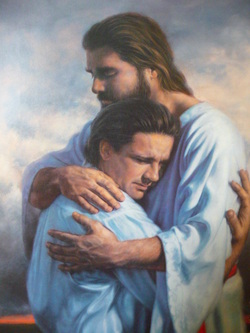 God has said that if we wish to live with Him once more, we need to be perfect, but He knows that we can't possibly do that on our own. As mortal beings, we are naturally weak and undisciplined. It is not only expected that we will mess up throughout our lives, but inevitable. So how can God expect perfection from children He knows are incapable of it?
It is with this in mind, that our Heavenly Father sent is Son, Jesus Christ to live among us. As God's Son, Christ had the capability to fully temper and control the natural urges and temptations that His mortal body would experience. Having absolutely no sin of His own, Christ gave Himself as a sacrifice for our sins, and also for our pains, infirmities, and yes, our guilt. He felt all of it. He experienced every bit of suffering that human family had, did, and would ever experience. And why? This was the price paid to allow us an out from our sins.
Thanks to this atonement made by Jesus Christ, our Savior, if we do everything we can to fix the situation presented by our misdoings, and gratefully acknowledge the miraculous sacrifice that Christ made, we can fully repent. And as far as God is concerned, the sin never happened. We are as clean and pure as the day we were born. This is how we achieve perfection, through Christ.
As we earnestly repent of our sins and misdeeds, and look upon Christ, we are given the wonderful gift of a clean conscience. There is no point to carry the shame with us once we have been forgiven by our loving Heavenly Father. It is time to forgive ourselves, and jettison any self-hate from our souls. God doesn't count it against us anymore. Why should we?
 Technically, the Church of Jesus Christ of Latter-day Saints ( Mormonism) has been in my family for several generations. I grew up in a family of people who grew up in the Church. It has always been in my life. I imagine this is true of many different people in many different religions; Their faith is in their blood, a hereditary trait almost. While the above scenario describes myself and many others, it is not true of everyone in my religion. Many among our number were born into other churches or belief-systems, worshiping in other ways, and following different rules. For a myriad of reasons, these people took their own spiritual journeys, and found for themselves something the rest of us grew up with. While I am ever grateful for my upbringing in the beautiful Gospel of Jesus Christ, I have always had a certain respect for converts, those who sought for the truth, and found something wonderful that I was practically handed. They had to work for it, and they might have had to overcome obstacles and baggage along the way that I was never burdened with. I always joy in hearing their stories, who they used be, or what they had to face on the road to Christ. I look up to these people for their hard work, and their faith. It got me thinking about my own story. Though I was very thankful for the generous blessings that have been bestowed on me, I couldn't help but feel a little bit jealous of converts. These are men and women who worked for something I sometimes take for granted. The Gospel of Christ really means something to them, because they know what it's like without it. When I think about it, my logic is all backward. It's like a man who's inherited great riches that envies a once-poor man who worked hard and became rich by the sweat of his own brow. I had it all wrong though. I am still on a road to Christ, and so are those people I envied. I was mistakenly viewing conversion as a destination, a one-time event. I have come to realize, however, that conversion is not a stop along the road, but the road itself. I had thought of myself as a man who was born at the destination. I liked where I was, but felt a little robbed of the journey that others got to take. But that was not the case at all. It was more like I had been born at the trailhead, in the company of men and women who know the the road, and can give me directions when I need them. I have companions to share the adventure with, and protectors to keep me safe from the perils of the journey. Others may have had to search for the path, and as I've met them on the road, I've welcomed them into my convoy excited to learn about my new fellow traveler. We are all travelers on the road of conversion. This road leads to Jesus Christ. It is a bumpy road, and not always the easiest road, and we might occasionally try alternate routes. But this long, bumpy road is the only one that leads to true happiness. Other roads may offer a more comfortable journey in the short-term, but they lead nowhere. Why sell an eternity at a wonderful destination at the end of a winding mountain road for a fleeting detour down Easy Street, a wide, smooth freeway that offers nothing but a dead-end in a bad neighborhood? In this sense, I am a convert to Mormonism, a convert to the gospel of Jesus Christ and His teachings. I may have had certain advantages on my journey, but I, along with everyone else, must take the journey all the same. I look forward to seeing you on the road.
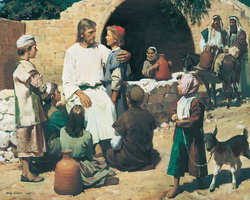 Jesus Christ takes on many roles. He is our teacher, our master, our elder brother, and our redeemer, just to name a few. One exceptionally large role he fills is as the Son of God. But what does it mean to be the Son of God? Aren't we all God's children?
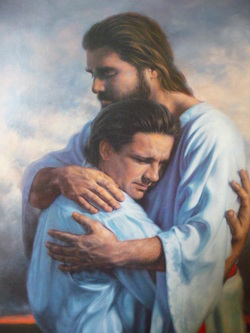 Life by its very nature is filled with trial and hardship. To experience life is to experience all things, the good and the bad. At times the bad will appear to outweigh any good, and the burden will become so crushing and hard to bear, that our view of the good slips, and we'll see nothing but the darkness supplied by our anguish. There is however, a way out of rough times, and back into the light. His name is Jesus Christ.I sometimes wonder why a God that loves me would put me through such pain. Why, when I am trying my hardest, am I succumbing to woes of a troubled heart? I have had a handful of times in my short life where anguish seemed to prevail, and the grasp of the evil one seemed to drag my soul deeper. Each of these experiences, though challenging, have seemed to fortify me for the next, and show me by stark contrast the beauty of a good day. I come out of them taking more pleasure in simple things, and with more faith that the future will be better. It stands to reason then, that this is why my Lord and Savior would deem me worthy of such pain, even when I am being righteous. That my Father, in an effort to strengthen me for things to come, is giving me a little bit more than I thought I could handle, so that in the future, I know I can handle more. Sometimes, however, this knowledge alone just isn't enough to carry on with. We might not have the strength inside us to withstand every challenge, and we may stumble and fall. But that is the beauty of Jesus Christ; that when we have spent some time at our lowest, and are holding on with the last piece of energy within us, He can step in and stretch us. He will take a normal man who is trying, and create something extraordinary. Though He may not have made our problems smaller, He has made us big enough to conquer them. If we still feel it unfair that God would deign to give us trials, we need only remember one thing: the Son of God, our Savior Jesus Christ, experienced them too. In the Garden of Gethsemane, our Lord experienced the anguish and grief, for every sin, every disappointment, and every sorrow that has ever been felt, or will be felt. He experienced even your pains. From this day on, stand strong in the comforting knowledge that through every time of trouble, every moment of pain, Jesus the Christ has been there, holding you, helping you, or cheering you on. He truly wants you to be happy, more than even you do. That is why He descended below all things, so that no matter how far you fall, He will be there to catch you. All you must do is trust that He can show you the way back up. And follow Him.
 Throughout my life, the name Jesus Christ has always carried great weight. Sacred and deeply personal, I have always viewed Jesus as the ultimate example-- even if, being human, my actions sometimes speak otherwise. It continually stuns me that a being as supremely perfect as the Savior would give an imperfect wretch like myself the time of day. And that he does the same for everyone who has ever lived, is living, and will live. The love of Jesus is one free of condition. Free of judgement, not based on physical appeal, station in life, or even personality. His perfect love is based only on the fact that we are all daughters and sons of God. His teachings show time and time again the importance of loving others: 1st John 4:7-8 "Beloved, let us love one another: for love is of God; and every one that loveth is born of God, and knoweth God.
He that loveth not knoweth not God; for God is love." Romans 13:8 "Owe no man any thing, but to love one another: for he that loveth another hath fulfilled the law."John 13:34-35 "A new commandment I give unto you, That ye love one another; as I have loved you, that ye also love one another.By this shall all men know that ye are my disciples, if ye have alove one to another."My savior Jesus Christ, in his infinite love, endured unfathomable pain in the Garden of Gethsemane on my behalf. On all our behalf. To do so for one person would show great love, but to do so for all is something else entirely. The love shown by our Savior in his atoning sacrifice and indeed throughout is ministry and eternal existence fills my heart with the warmest gratitude for Him, and a desire to emulate such love for my fellow man, as He no doubt desires me to. I close in His name, Jesus Christ-- Amen
We all make sacrifices. Every one of us has at one time or another given up something for a greater purpose. We all know how this feels. But one thing that none can begin to comprehend is the magnitude of the sacrifice our Lord and Savior Jesus Christ made on our behalf. A mortal being cannot feel the same degree of love, or experience the same level of devotion that our elder brother had for us. But through the guiding influence of the Holy Ghost, one can come to appreciate and relish the gift that our Lord has given us in the atonement, and we can learn to accept this gift in our lives and apply it where we are in need. The atonement of our Savior was an all-encompassing sacrifice. Prior to the time of Jesus, believers followed what is known as the Law of Moses, the code of righteousness given by God in that era. With the coming of Jesus Christ, however, the Law of Moses was replaced with a higher law. The night before his crucifixion, Jesus and his twelve apostles convened in the top floor a house, and had what we refer to as the Last Supper. Jesus broke and blessed bread for the apostles and explained that it was a representation of his body. He blessed and passed around wine, explaining that it was a representation of the blood he would shed for them. These actions would in time become known as the Sacrament. After the Last Supper, Jesus and his disciples walked into the garden of Gethsemane. The Savior told his disciples to stay back and kneel, to pray that they enter not into temptation. He continued to walk several yards further, until he was alone. It was then that Jesus Christ prayed to his eternal father, and begged, s aying, "Father, if thou be willing, remove this cup from me: nevertheless not my will, but thine, be done."Our Redeemer suffered there in the Garden of Gethsemane. He felt every pain, experienced every ailment, and endured all sorrow that man had ever, and will ever feel, all at once. He writhed in pain, and in his agony, he bled from every pore of his body.He was then betrayed by his apostle, Judas, who sold him to the angry Pharisees, who beat him, mocked him, unjustly tried him, and crucified him, one of the most painful forms of murder that man has ever devised. He gave up the ghost, and ascended unto his father, returning three days later as a perfect, resurrected being.This pain was not needless. Our Lord Jesus Christ suffered these agonies to understand us, to descend below the deepest depth that man could sink to, to empathize with all pain and sorrow that man could feel. His agony atoned for our pains and ailments, but more importantly, it atoned for our sins. Thanks to the Lord's sacrifice, we can activate the atonement when we sin, we can repent, and turn away from our sins by partaking of the sacrament and washing away our sins with the help of our Savior and Redeemer.We must always remember the love and devotion that Jesus Christ feels for us. He, as our elder brother, wants nothing less than for us to succeed. The life he freely gave and the crushing burden he freely bore are indeed a testament to his loving care, and he loves us all unconditionally. I leave you with my testimony, that our Savior Jesus Christ is the literal son of God, that he atoned for our sins so that we could come closer to our father. I testify of our Savior's love, of my love for him, and of the perfect example of righteousness he is in my life. I close this article in his holy name, Jesus Christ--Amen
|







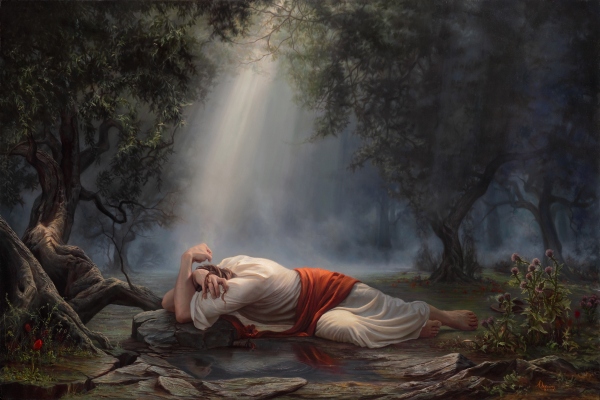
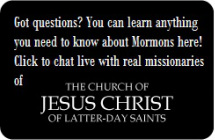
 RSS Feed
RSS Feed